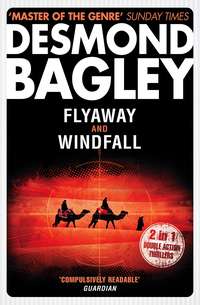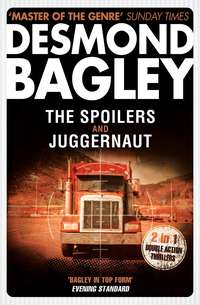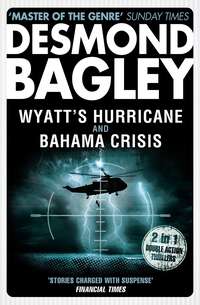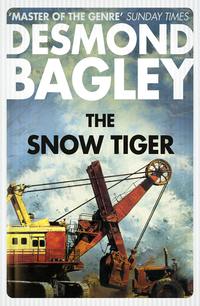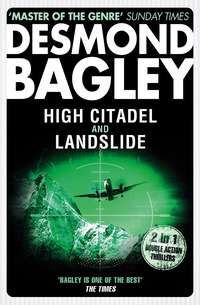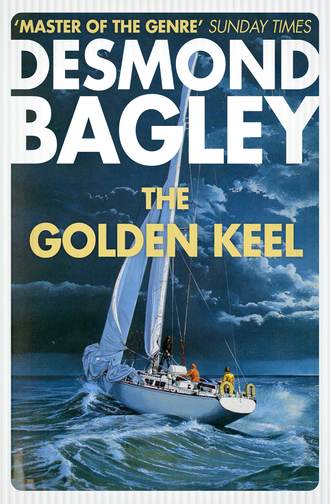
Полная версия
The Golden Keel
Because of this he hated Fascism – hated the pretensions of the parvenu rulers of Italy with all their corrupt ways and their money-sticky fingers. To him Mussolini always remained a mediocre journalist who had succeeded in demagoguery and had practically imprisoned his King.
Walker met the Count the first day he arrived at the hill camp. He had just woken up and seen the solemn face of the little girl. She smiled at him and silently left the room, and a few minutes later a short stocky man with a bristling beard stepped through the doorway and said in English, ‘Ah, you are awake. You are quite safe now.’
Walker was conscious of saying something inane. ‘But where am I?’
‘Does that really matter?’ the Count asked quizzically. ‘You are still in Italy – but safe from the Tedesci. You must stay in bed until you recover your strength. You need some blood putting back – you lost a lot – so you must rest and eat and rest again.’
Walker was too weak to do more than accept this, so he lay back on the pillow. Five minutes later Coertze came in; with him was a young man with a thin face.
‘I’ve brought the quack,’ said Coertze. ‘Or at least that’s what he says he is – if I’ve got it straight. My guess is that he’s only a medical student.’
The doctor – or student – examined Walker and professed satisfaction at his condition. ‘You will walk within the week,’ he said, and packed his little kit and left the room.
Coertze rubbed the back of his head. ‘I’ll have to learn this slippery taal,’ he said. ‘It looks as though we’ll be here for a long time.’
‘No chance of getting through to the south?’ asked Walker.
‘No chance at all,’ said Coertze flatly. ‘The Count – that’s the little man with the bokbaardjie – says that the Germans down south are thicker on the ground than stalks in a mealie field. He reckons they’re going to make a defence line south of Rome.’
Walker sighed. ‘Then we’re stuck here.’
Coertze grinned. ‘It is not too bad. At least we’ll get better food than we had in camp. The Count wants us to join his little lot – it seems he has some kind of skietkommando which holds quite a bit of territory and he’s collected men and weapons while he can. We might as well fight here as with the army – I’ve always fancied fighting a war my way.’
A plump woman brought in a steaming bowl of broth for Walker, and Coertze said, ‘Get outside of that and you’ll feel better. I’m going to scout around a bit.’
Walker ate the broth and slept, then woke and ate again. After a while a small figure came in bearing a basin and rolled bandages. It was the little girl he had seen when he had first opened his eyes. He thought she was about twelve years old.
‘My father said I had to change your bandages,’ she said in a clear young voice. She spoke in English.
Walker propped himself up on his elbows and watched her as she came closer. She was neatly dressed and wore a white, starched apron. ‘Thank you,’ he said.
She bent to cut the splint loose from his leg and then she carefully loosened the bandage round the wound. He looked down at her and said, ‘What is your name?’
‘Francesca.’
‘Is your father the doctor?’ Her hands were cool and soft on his leg.
She shook her head. ‘No,’ she said briefly.
She bathed the wound in warm water containing some pungent antiseptic and then shook powder on to it. With great skill she began to rebandage the leg.
‘You are a good nurse,’ said Walker.
It was only then that she looked at him and he saw that she had cool, grey eyes. ‘I’ve had a lot of practice,’ she said, and Walker was abashed at her gaze and cursed a war which made skilled nurses out of twelve-year-olds.
She finished the bandaging and said, ‘There – you must get better soon.’
‘I will,’ promised Walker. ‘As quickly as I can. I’ll do that for you.’
She looked at him with surprise. ‘Not for me,’ she said. ‘For the war. You must get better so that you can go into the hills and kill a lot of Germans.’
She gravely collected the soiled bandages and left the room, with Walker looking after her in astonishment. Thus it was that he met Francesca, the daughter of Count Ugo Montepescali.
In a little over a week he was able to walk with the aid of a stick and to move outside the hospital hut, and Coertze showed him round the camp. Most of the men were Italians, army deserters who didn’t like the Germans. But there were many Allied escapees of different nationalities.
The Count had formed the escapees into a single unit and had put Coertze in command. They called themselves the ‘Foreign Legion’. During the next couple of years many of them were to be killed fighting against the Germans with the partisans. At Coertze’s request, Alberto and Donato were attached to the unit to act as interpreters and guides.
Coertze had a high opinion of the Count. ‘That kêrel knows what he’s doing,’ he said. ‘He’s recruiting from the Italian army as fast as he can – and each man must bring his own gun.’
When the Germans decided to stand and fortified the Winterstellung based on the Sangro and Monte Cassino, the war in Italy was deadlocked and it was then that the partisans got busy attacking the German communications. The Foreign Legion took part in this campaign, specializing in demolition work. Coertze had been a gold miner on the Witwatersrand before the war and knew how to handle dynamite. He and Harrison, a Canadian geologist, instructed the others in the use of explosives.
They blew up road and rail bridges, dynamited mountain passes, derailed trains and occasionally shot up the odd road convoy, always retreating as soon as heavy fire was returned. ‘We must not fight pitched battles,’ said the Count. ‘We must not let the Germans pin us down. We are mosquitoes irritating the German hides – let us hope we give them malaria.’
Walker found this a time of long stretches of relaxation punctuated by moments of fright. Discipline was easy and there was no army spit-and-polish. He became lean and hard and would think nothing of making a day’s march of thirty miles over the mountains burdened with his weapons and a pack of dynamite and detonators.
By the end of 1944 the Foreign Legion had thinned down considerably. Some of the men had been killed and more elected to make a break for the south after the Allies had taken Rome. Coertze said he would stay, so Walker stayed with him. Harrison also stayed, together with an Englishman called Parker. The Foreign Legion was now very small indeed.
‘The Count used us as bloody pack horses,’ said Walker. He had ordered another round of drinks and the brandy was getting at him. His eyes were red-veined and he stumbled over the odd word.
‘Pack horses?’ I queried.
‘The unit was too small to really fight,’ he explained. ‘So he used us to transport guns and food around his territory. That’s how we got the convoy.’
‘Which convoy?’
Walker was beginning to slur his words. ‘It was like this. One of the Italian units had gone to carve up a German post and the job was being done in co-operation with another partisan brigade. But the Count was worried because this other mob were Communists – real treacherous bastards they were. He was scared they might renege on us; they were always doing that because he was a Monarchist and they hated him worse than they did the Germans. They were looking ahead to after the war and they didn’t do much fighting while they were about it. Italian politics, you see.’
I nodded.
‘So he wanted Umberto – the chap in charge of our Italians – to have another couple of machine-guns, just in case, and Coertze said he’d take them.’
He fell silent, looking into his glass.
I said, ‘What about this convoy?’
‘Oh, what the hell,’ he said. There’s not a hope of getting it out. It’ll stay there for ever, unless Coertze does something. I’ll tell you. We were on our way to Umberto when we bumped into this German convoy driving along where no convoy should have been. So we clobbered it.’
They had got to the top of a hill and Coertze called a halt. ‘We stay here for ten minutes, then we move on,’ he said.
Alberto drank some water and then strolled down to where he could get a good view of the valley. He looked first at the valley floor where a rough, unmetalled road ran dustily, then raised his eyes to look south.
Suddenly he called Coertze. ‘Look,’ he said.
Coertze ran down and looked to where Alberto was pointing. In the distance, where the faraway thread of brown road shimmered in the heat, was a puff of dust. He unslung his glasses and focused rapidly.
‘What the hell are they doing here?’ he demanded.
‘What is it?’
‘German army trucks,’ said Coertze. ‘About six of them.’ He pulled down the glasses. ‘Looks as though they’re trying to slip by on the side roads. We have made the main roads a bit unhealthy.’
Walker and Donato had come down. Coertze looked back at the machine-guns, then at Walker. ‘What about it?’
Walker said, ‘What about Umberto?’
‘Oh, he’s all right. It’s just the Count getting a bit fretful now the war’s nearly over. I think we should take this little lot – it should be easy with two machine-guns.’
Walker shrugged. ‘O.K. with me,’ he said.
Coertze said, ‘Come on,’ and ran back to where Parker was sitting. ‘On your feet, kêrel,’ he said. ‘The war’s still on. Where the hell is Harrison?’
‘Coming,’ called Harrison.
‘Let’s get this stuff down to the road on the double,’ said Coertze. He looked down the hill. ‘That bend ought to be a lekker place.’
‘A what?’ asked Parker plaintively. He always pulled Coertze’s leg about his South Africanisms.
‘Never mind that,’ snapped Coertze. ‘Get this stuff down to the road quick. We’ve got a job on.’
They loaded up the machine-guns and plunged down the hillside. Once on the road Coertze did a quick survey. ‘They’ll come round that bend slowly,’ he said. ‘Alberto, you take Donato and put your machine-gun there, where you can open up on the last two trucks. The last two, you understand. Knock ’em out fast so the others can’t back out.’
He turned to Harrison and Parker. ‘Put your gun over here on the other side and knock out the first truck. Then we’ll have the others boxed in.’
‘What do I do?’ asked Walker.
‘You come with me,’ Coertze started to run up the road, followed by Walker. He ran almost to the bend, then left the road and climbed a small hillock from where he could get a good sight of the German convoy. When Walker flopped beside him he already had the glasses focused.
‘It’s four trucks not six,’ he said. ‘There’s a staff car in front and a motor-cycle combination in front of that. Looks like one of those BMW jobs with a machine-gun in the side-car.’
He handed the glasses to Walker. ‘How far from the tail of the column to that staff car?’
Walker looked at the oncoming vehicles. ‘About sixty-five yards,’ he estimated.
Coertze took the glasses. ‘O.K. You go back along the road sixty-five yards so that when the last truck is round the bend the staff car is alongside you. Never mind the motor-cycle – I’ll take care of that. Go back and tell the boys not to open up until they hear loud bangs; I’ll start those off. And tell them to concentrate on the trucks.’
He turned over and looked back. The machine-guns were invisible and the road was deserted. ‘As nice an ambush as anyone could set,’ he said. ‘My oupa never did better against the English.’ He tapped Walker on the shoulder. ‘Off you go. I’ll help you with the staff car as soon as I’ve clobbered the motor-cycle.’
Walker slipped from the hillock and ran back along the road, stopping at the machine-guns to issue Coertze’s instructions. Then he found himself a convenient rock about sixty yards from the bend, behind which he crouched and checked his sub-machine-gun.
It was not long before he heard Coertze running along the road shouting, ‘Four minutes. They’ll be here in four minutes. Hold your fire.’
Coertze ran past him and disappeared into the verge of the road about ten yards farther on.
Walker said that four minutes in those conditions could seem like four hours. He crouched there, looking back along the silent road, hearing nothing except his own heart beating. After what seemed a long time he heard the growl of engines and the clash of gears and then the revving of the motor-cycle.
He flattened himself closer to the rock and waited. A muscle twitched in his leg and his mouth was suddenly dry. The noise of the motor-cycle now blanked out all other sounds and he snapped off the safety catch.
He saw the motor-cycle pass, the goggled driver looking like a gargoyle and the trooper in the sidecar turning his head to scan the road, hands clutching the grips of the machine-gun mounted in front of him.
As in a dream he saw Coertze’s hand come into view, apparently in slow motion, and toss a grenade casually into the sidecar. It lodged between the gunner’s back and the coaming of the sidecar and the gunner turned in surprise. With his sudden movement the grenade disappeared into the interior of the sidecar.
Then it exploded.
The sidecar disintegrated and the gunner must have had his legs blown off. The cycle wheeled drunkenly across the road and Walker saw Coertze step out of cover, his sub-machine-gun pumping bullets into the driver. Then he had stepped out himself and his own gun was blazing at the staff car.
He had orientated himself very carefully so that he had a very good idea of where the driver would be placed. When he started firing, he did so without aiming and the windscreen shattered in the driver’s face.
In the background he was conscious of the tac-a-tac of the machine-guns firing in long bursts at the trucks, but he had no time or desire to cast a glance that way. He was occupied in jumping out of the way of the staff car as it slewed towards him, a dead man’s hand on the wheel.
The officer in the passenger seat was standing up, his hand clawing at the flap of his pistol holster. Coertze fired a burst at him and he suddenly collapsed and folded grotesquely over the metal rim of the broken windscreen as though he had suddenly turned into a rag doll. The pistol dropped from his hand and clattered on the ground.
With a rending jar the staff car bumped into a rock on the side of the road and came to a sudden stop, jolting the soldier in the rear who was shooting at Walker. Walker heard the bullets going over his head and pulled the trigger. A dozen bullets hit the German and slammed him back in his seat. Walker said that the range was about nine feet and he swore he heard the bullets hit, sounding like a rod hitting a soft carpet several times.
Then Coertze was shouting at him, waving him on to the trucks. He ran up the road following Coertze and saw that the first truck was stopped. He fired a burst into the cab just to be on the safe side, then took shelter, leaning against the hot radiator to reload.
By the time he had reloaded the battle was over. All the vehicles were stopped and Alberto and Donato were escorting a couple of dazed prisoners forward.
Coertze barked, ‘Parker, go up and see if anyone else is coming,’ then turned to look at the chaos he had planned.
The two men with the motor-cycle had been killed outright, as had the three in the staff car. Each truck had carried two men in the cab and one in the back. All the men in the cabs had been killed within twenty seconds of the machine-guns opening fire. As Harrison said, ‘At twenty yards we couldn’t miss – we just squirted at the first truck, then hosed down the second. It was like using a howitzer at a coconut-shy – too easy.’
Of the seventeen men in the German party there were two survivors, one of whom had a flesh wound in his arm.
Coertze said, ‘Notice anything?’
Walker shook his head. He was trembling in the aftermath of danger and was in no condition to be observant.
Coertze went up to one of the prisoners and fingered the emblem on his collar. The man cringed.
‘These are S.S. men. All of them.’
He turned and went back to the staff car. The officer was lying on his back, half in and half out of the front door, his empty eyes looking up at the sky, terrible in death. Coertze looked at him, then leaned over and pulled a leather briefcase from the front seat. It was locked.
‘There’s something funny here,’ he said. ‘Why would they come by this road?’
Harrison said, ‘They might have got through, you know. If we hadn’t been here they would have got through – and we were only here by chance.’
‘I know,’ said Coertze. ‘They had a good idea and they nearly got away with it – that’s what I’m worrying about. The Jerries aren’t an imaginative lot, usually; they follow a routine. So why would they do something different? Unless this wasn’t a routine unit.’
He looked at the trucks. ‘It might be a good idea to see what’s in those trucks.’
He sent Donato up the road to the north to keep watch and the rest went to investigate the trucks, excepting Alberto who was guarding the prisoners.
Harrison looked over the tailboard of the first truck. ‘Not much in here,’ he said.
Walker looked in and saw that the bottom of the truck was filled with boxes – small wooden boxes about eighteen inches long, a foot wide and six inches deep. He said, ‘That’s a hell of a small load.’
Coertze frowned and said, ‘Boxes like that ring a bell with me, but I just can’t place it. Let’s have one of them out.’
Walker and Harrison climbed into the truck and moved aside the body of a dead German which was in the way. Harrison grasped the corner of the nearest box and lifted. ‘My God!’ he said. ‘The damn’ thing’s nailed to the floor.’
Walker helped him and the box shifted. ‘No, it isn’t, but it must be full of lead.’
Coertze let down the tailboard. ‘I think we’d better have it out and opened,’ he said. His voice was suddenly croaking with excitement.
Walker and Harrison manhandled a box to the edge and tipped it over. It fell with a loud thump to the dusty road. Coertze said, ‘Give me that bayonet.’
Walker took the bayonet from the scabbard of the dead German and handed it to Coertze, who began to prise the box open. Nails squealed as the top of the box came up. Coertze ripped it off and said, ‘I thought so.’
‘What is it?’ asked Harrison, mopping his brow.
‘Gold,’ said Coertze softly.
Everyone stood still.
Walker was very drunk when he got to this point of his story. He was unsteady on his feet and caught the edge of the bar counter to support himself as he repeated solemnly, ‘Gold.’
‘For the love of Mike, what did you do with it?’ I said. ‘And how much of it was there?’
Walker hiccoughed genthy. ‘What about another drink?’ he said.
I beckoned to the bar steward, then said, ‘Come on; you can’t leave me in suspense.’
He looked at me sideways. ‘I really shouldn’t tell,’ he said. ‘But what the hell! There’s no harm in it now. It was like this …’
They had stood looking at each other for a long moment, then Coertze said, ‘I knew I recognized those boxes. They use boxes like that on the Reef for packing the ingots for shipment.’
As soon as they had checked that all the boxes in that truck were just as heavy, there was a mad rush to the other trucks. These were disappointing at first – the second truck was full of packing cases containing documents and files.
Coertze delved into a case, tossing papers out, and said, ‘What the hell’s all this bumph?’ He sounded disappointed.
Walker picked up a sheaf and scanned through it. ‘Seems to be Italian Government documents of some sort. Maybe this is all top-secret stuff.’
The muffled voice of Harrison came from the bowels of the truck. ‘Hey, you guys, look what I’ve found.’
He emerged with both hands full of bundles of lire notes – fine, newly printed lire notes. ‘There’s at least one case full of this stuff,’ he said. ‘Maybe more.’
The third truck had more boxes of gold, though not as much as the first, and there were several stoutly built wooden cases which were locked. They soon succumbed to a determined assault with a bayonet.
‘Christ!’ said Walker as he opened the first. In awe he pulled out a shimmering sparkle of jewels, a necklace of diamonds and emeralds.
‘What’s that worth?’ Coertze asked Harrison.
Harrison shook his head dumbly. ‘Gee, I wouldn’t know.’ He smiled faintly. ‘Not my kind of stone.’
They were ransacking the boxes when Coertze pulled out a gold cigarette case. ‘This one’s got an inscription,’ he said and read it aloud. ‘“Caro Benito da parte di Adolfe – Brennero – 1940.”’
Harrison said slowly, ‘Hitler had a meeting with Mussolini at the Brenner Pass in 1940. That’s when Musso decided to kick in on the German side.’
‘So now we know who this belongs to,’ said Walker, waving his hand.
‘Or used to belong to,’ repeated Coertze slowly. ‘But who does it belong to now?’
They looked at each other.
Coertze broke the silence. ‘Come on, let’s see what’s in the last truck.’
The fourth truck was full of packing cases containing more papers. But there was one box holding a crown.
Harrison struggled to lift it. ‘Who’s the giant who wears this around the palace?’ he asked nobody in particular. The crown was thickly encrusted with jewels – rubies and emeralds, but no diamonds. It was ornate and very heavy. ‘No wonder they say “uneasy lies the head that wears a crown,”’ cracked Harrison.
He lowered the crown into the box. ‘Well, what do we do now?’
Coertze scratched his head. ‘It’s quite a problem,’ he admitted.
‘I say we keep it,’ said Harrison bluntly. ‘It’s ours by right of conquest.’
Now it was in the open – the secret thought that no one would admit except the extrovert Harrison. It cleared the air and made things much easier.
Coertze said, ‘I suppose we must bring in the rest of the boys and vote on it.’
‘That’ll be no good unless it’s a unanimous vote,’ said Harrison almost casually.
They saw his point. If one of them held out in favour of telling the Count, then the majority vote would be useless. At last Walker said, ‘It may not arise. Let’s vote on it and see.’
All was quiet on the road so Donato and Parker were brought in from their sentry duty. The prisoners were herded into a truck so that Alberto could join in the discussion, and they settled down as a committee of ways and means.
Harrison needn’t have worried – it was a unanimous vote. There was too much temptation for it to be otherwise.
‘One thing’s for sure,’ said Harrison. ‘When this stuff disappears there’s going to be the biggest investigation ever, no matter who wins the war. The Italian Government will never rest until it’s found, especially those papers. I’ll bet they’re dynamite.’
Coertze was thoughtful. ‘That means we must hide the treasure and the trucks. Nothing must be found. It must be as though the whole lot has vanished into thin air.’
‘What are we going to do with it?’ asked Parker. He looked at the stony ground and the thin soil. ‘We might just bury the treasure if we took a week doing it, but we can’t even begin to bury one truck, let alone four.’
Harrison snapped his fingers. ‘The old lead mines,’ he said. ‘They’re not far from here.’
Coertze’s face lightened. ‘Ja,’ he said. ‘There’s one winze that would take the lot.’
Parker said, ‘What lead mines – and what’s a winze, for God’s sake?’
‘It’s a horizontal shaft driven into a mountain,’ said Harrison. ‘These mines have been abandoned since the turn of the century. No one goes near them any more.’


